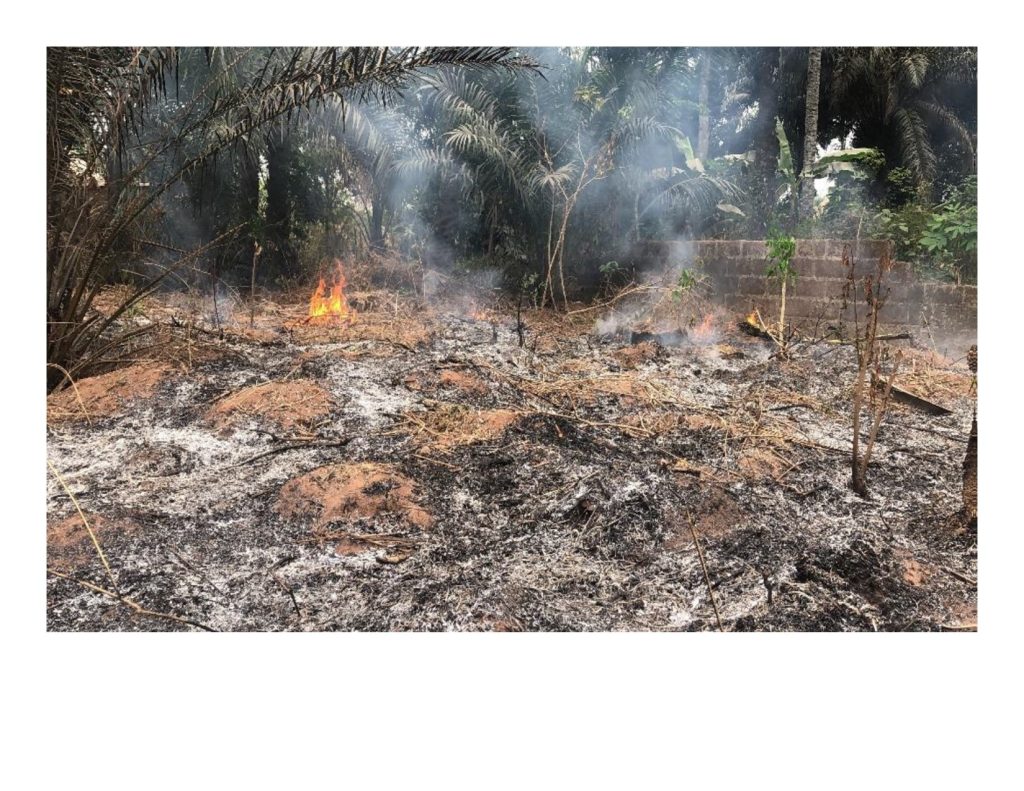By Chinedum Nwajiuba, 130323

In this month of March, farmers have aggressively moved into the farms. The traditional cropping systems around the rainforest areas of Nigeria, has persisted and we see land clearing, tilling, and sowing/planting happening. As has been the case traditionally, this goes with bush burning, or more appropriately, with not much bush to clear these days, the burning of plant/biological materials.
According to Ojochenemi E. Yakubu, Otitoju Gto, and Uka Daniel (2019), bush burning is the removal of the natural vegetation cover that protects the soil surface using fire. This exposes the land to the effect of wind, water erosion and ultraviolet radiation. Bush burning has detrimental effect to the environment, health, and the economy. It involves the production of air pollution such as carbon monoxide, hydrocarbon, hydrogen sulphide, nitrogen oxide, sulphur, ozone, and other oxidants. Particulate pollutants such as dust, fume, mist, and smoke are also obtained from bush burning.
There is a problem with the continued practice of bush burning, or more appropriately burning plant materials cleared as farmers prepare the land for tillage and planting. This has been the practice, and despite previous campaigns decades ago to stop bush burning, we have continued to do so.
Personally, in my space, I try to advise farmers to stop burning plant materials, but no one seems to want to stop that. I have explained and asked several farmers as I walk round my community, Umuezeala-Nsu in the Ehime-Mbano LGA of Imo state, why they will not stop burning these materials. The common answer seems to be that we are used to it. There may be other reasons for this, and especially in the past, but the commonest mentioned reason is cultural – we are used to that. Farmers say to me, “Prof., we know you have been saying this, but we are used to that.” “That is what we know.”
Some farmers mentioned specific weeds that need to be burnt. These are especially thorny plants. In the past we learnt that the difficulties with respect to labour for land preparation, and subsequently, for weeding, encouraged farmers to engage in bush burning. This, as earlier stated, is despite campaigns to stop bush burning. Sadly, in recent times, we no longer notice such campaigns against bush burning. There are no more ceremonies marking the official commencement of the farming season, and no farming calendar the way we used to have them annually by the Agricultural Development Programmes (ADPs), which was the main agency for public extension services. There is no more annual farming competition in which all local government areas brought their best farmers for exhibition, and prizes awarded to various categories. The public extension services seem to be dead in Nigeria, just as most state ministries of agriculture seem not to exist. In effect no one seems to be driving such attempts to shift away from traditional practices or promote what science recommends.
The place of technology and innovation in the transformation and development of agriculture is something we know and appreciate. Prof. Theodore Schultz put it so elegantly:
“The man who farms as his forefathers did cannot produce much food no matter how rich the land or how hard he works. The farmer who has access to and knows how to use what science knows about soils, plants, animals, and machines can produce abundance of food though the land be poor. Nor need he work nearly so hard and long. He can produce so much that his brothers and some of his neighbors will move to town to earn their living.” ––T W Schultz (1964) (Noble Prize winner for Economics, 1979).
While reflecting on the lessons of the views of Schultz, which is focused on technology and agriculture, I present an extract from the book by Olaudah Equiano: The Interesting Narrative of the Life of Olaudah Equiano (1789).
“Our tillage is exercised in a large plain or common, some hours walk from our dwellings, and all the neighbours resort thither in a body. They use no beasts of husbandry; and their only instruments are hoes, axes, shovels, and beaks, or pointed iron to dig with.”
(Source: https://docsouth.unc.edu/neh/equiano1/equiano1.html, Page 22). The Interesting Narrative of the Life of Olaudah Equiano, or Gustavus Vassa, the African. Written by Himself. Vol. I: Electronic Edition.
What is of interest here is Oladuah’s description of the state of agricultural technology in Igboland in the eighteenth century. Three centuries after we are still at the hoe and cutlass technology level. We are still engaged with bush burning. We have advanced in our consumption choices and technologies, just as we have advanced in the technologies for communication and transportation, but our production choices, our farming choices, and our farming technologies seem stuck three centuries behind.
Our agriculture has remained at the level of setting the bush and biological materials from land clearing on fire. There are very important reasons we should stop this.
These include, among others, the following:
1. With increasing population density, urbanization, and other factors, the traditional cropping systems which entailed some years of fallow is no longer the case. Continuous cropping or land-use intensification must necessarily be supported by technologies, including those for soil fertility management.
Traditional farming systems evolved from shifting cultivation to fallow systems, which required a good number of years for the soil to regenerate her natural fertility status, to yield sufficiently to make land, labour, and capital investment in cropping worth the effort. Without sufficient mineral/inorganic fertilizers, yield levels have declined. Even where available, mineral/inorganic fertilizer use is constrained by multiple factors including unavailability, costs, and abuse. When farmers burn the plant materials which are organic, they deny the soil such which could contribute to some extent in positively impacting on soil fertility. Low capital, and low labour productivity is a disincentive to farmers, and with an aging farming population, not enough new farmers are emerging.
The historical pattern observed elsewhere is that as technology use is increased in agriculture, resource-use productivity increases, and labour is shed as fewer farm hands are required not only to sustain aggregate production levels, but indeed to increase them. In our case, technological stagnation, including mechanical and biological, among others, is met by an aging farming population and decreasing farm hands. Very few young persons therefore, want to engage in this type of agriculture.
2. It should be possible to encourage farmers to allow these organic materials strategically on the fields or use them in making compost. Compost making was taught in the primary and secondary schools but appears not to have been passed on to farmers via extension services, or not enough was done to make that a common farm practice. Therefore, farmers have continued to clear and burn these materials, and consequently denying the soils such organic materials.
3. When we burn these materials, the smoke released into the atmosphere is very heavy with carbon and related gases. Nigeria as with most other less developed countries justifiably claim that they make comparatively minimal contribution to global carbon emission, and therefore have a different kind of responsibility as the world grapples with climate change, and the pursuit of net zero. In fact, we talk about climate smart agriculture, and we talk about emissions from the agricultural sector – agriculture, forestry, and land use (AFLU)., but nothing is changing.
As we prepare for the COP28 this year to be held in Dubai, a COP that is about reporting and accounting, what shall we be presenting as advances we have made in any sector, least of all agriculture?
Nigeria has like other countries presented to the global community our commitment under the Paris Agreement and the subsequent Nationally Determined contribution (NDC) to carbon emission reduction, but we seem not to pay attention to bush burning as a contributor to global emission. Under the NDC, agriculture is a key sector of interest. If we are to be sincere about the pursuit of net-zero in carbon emission, we should resume active effort to stop bush burning.
Suppose we stop bush burning and then estimate the amount carbon stopped from being emitted that would be something to show the world. But this is rather late and, we are doing nothing practical aside meetings and workshops. We do not have to wait for the more developed countries to tell us what to do or even provide funding for that. Neither the funding nor technology for this do we need them. We can work on this for COP29, in 2024.
4. Then there are the health consequences of bush burning. All around the villages, we see smoke rising, and these can have effect on respiratory health, and others.
5. There is the other impact on the few rural tarred roads we have. Along the edges of these roads, farmers also burn the plant materials. Burning such materials besides or even on top of tarred roads adversely affects the health of the roads, as the bitumen, which is often used in road tarring, reacts to heat. When the integrity of these roads is adversely impacted, potholes and other degradation set in.
Who is sleeping on duty?
What remains now is articulating whose responsibilities this should be. This should be the responsibility of state governments. The Ministries of agriculture in the states need to be awakened from their sleep. Agricultural extension services need to be revived. Targets on carbon-emissions reduction from the agricultural sector should be set and pursued. Farmers need to be mobilized and encouraged to stop bush burning. Extension services should promote migrating from bush burning to making compost manure in farms. Penalties should be introduced on farmers who embark in bush burning.
But our state governments largely seem lost and anonymous in the challenges that our country faces. The Federal government need not from Abuja tell state governments to encourage agriculture, buy -into the challenges of the environment and climate change, or even to stop bush burning. Agriculture and environment are in the concurrent legislative list. The Federal Government however should reach out to state governments to play their roles in the agreements and commitments Nigeria entered in these global platforms.
Literature Cited:
Ojochenemi E. Yakubu, Otitoju Gto, and Uka Daniel (2019). “A review of impact of recurrent bush burning on the climate change paradigm: The Nigerian experience.”


